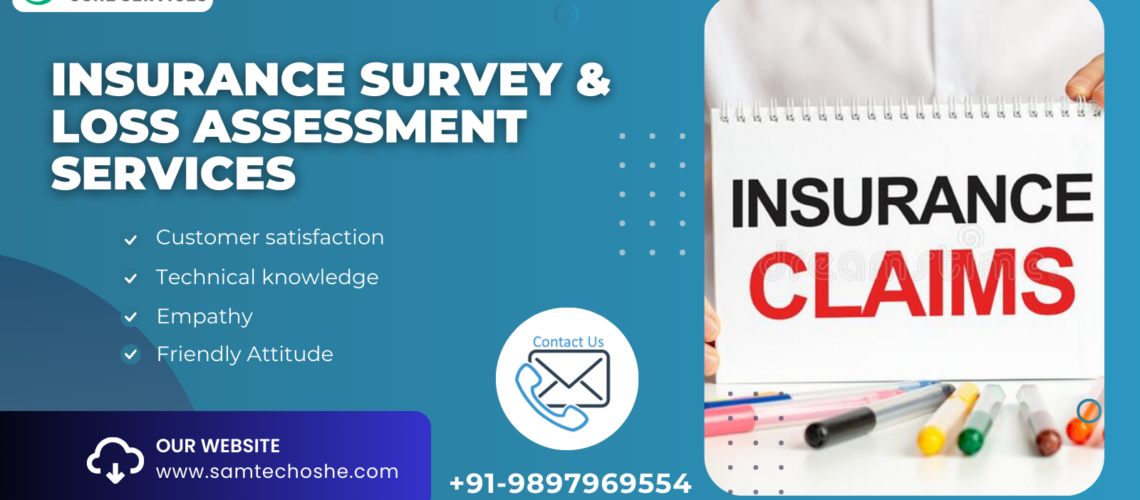Advanced Insurance Survey & Loss Assessment Solutions
February 3, 2025

In this blog, we will delve deeper into the importance of accurate insurance surveys and loss assessments in the context of today’s rapidly evolving risk environment. As both natural and man-made events become increasingly unpredictable, the role of these assessments has grown in significance. Whether you’re an individual filing a claim for a personal loss or a corporation looking to safeguard valuable assets, understanding the value of these services is crucial for making informed decisions.
The process of insurance surveying typically begins with a comprehensive evaluation of an asset, property, or business operation. Surveyors conduct a thorough inspection, taking into account various factors such as location, construction materials, age, maintenance history, and any potential vulnerabilities. This assessment is designed to provide insurers with a clear understanding of the value of the property or asset being insured, allowing them to set accurate coverage limits. The data gathered can also aid in identifying risks that may require additional coverage or protection, thereby minimizing the likelihood of underinsurance.
On the other hand, loss assessment occurs in the aftermath of a damaging event. Once an incident has taken place—whether it’s a fire, flood, storm, theft, or accident—a loss assessor evaluates the scale of the damage. This step is vital for both policyholders and insurers, as it directly influences the compensation process. A loss assessor will analyze physical damages, property value depreciation, and business interruption, ensuring that all relevant costs are considered for the final payout. The assessor’s report acts as an objective document that supports claims and ensures that the settlement is fair.
In certain situations, especially in large-scale incidents, the assessment may involve specialized professionals, such as structural engineers, forensic experts, or environmental consultants. These experts help to identify complex damage that might not be immediately visible, such as structural weaknesses or contamination risks. This holistic approach ensures that all losses are properly accounted for, leading to a more accurate claims outcome.
Technological advancements are also making insurance surveys and loss assessments more efficient and reliable. Innovations like Geographic Information Systems (GIS), satellite imaging, and drone technology are enabling surveyors to assess properties and damages from a safe distance, reducing the need for physical presence in potentially dangerous situations. These technologies are particularly valuable for surveying large or inaccessible areas, such as remote locations or commercial buildings with extensive infrastructure.
Furthermore, digital platforms and AI-powered tools are streamlining the entire process. Through the use of machine learning, insurers can predict potential risks more accurately and process claims faster. Automated data analysis allows for quicker and more detailed loss assessments, reducing manual errors and providing more precise evaluations. These technologies also contribute to better communication and transparency between insurers, policyholders, and third-party professionals.
Another critical aspect of modern loss assessment is ensuring compliance with local regulations and industry standards. Different regions may have specific guidelines for how loss assessments should be carried out, especially in highly regulated industries like construction, manufacturing, or agriculture. In many cases, insurers and policyholders are required to provide specific documentation and evidence to support claims. Insurance surveyors and loss assessors must be familiar with these legal and regulatory frameworks to avoid delays and ensure that all necessary procedures are followed.
As the insurance industry becomes more interconnected and complex, effective communication between insurers, surveyors, loss assessors, and clients is becoming increasingly important. Insurance policies are no longer “one-size-fits-all,” and different businesses and individuals may have unique needs and coverage requirements. Therefore, it’s essential for all parties involved to maintain clear and continuous communication throughout the process.
Insurance Survey and Loss Assessment Solutions are vital in ensuring that claims are handled efficiently, accurately, and fairly. With the ever-growing role of technology in the industry, these services are more precise and accessible than ever before. However, at the core of it all remains the need for skilled professionals who can evaluate risks and damages with the expertise and integrity that policyholders and insurers depend on.
In conclusion, whether you’re dealing with a minor claim or a major loss event, insurance surveys and loss assessments are indispensable in safeguarding your interests. They provide an objective, professional evaluation that ensures policyholders receive fair compensation while helping insurers manage risk effectively. Understanding these processes will help individuals and businesses navigate the often-complex landscape of insurance and claims, ultimately making the entire process smoother, faster, and more transparent.




